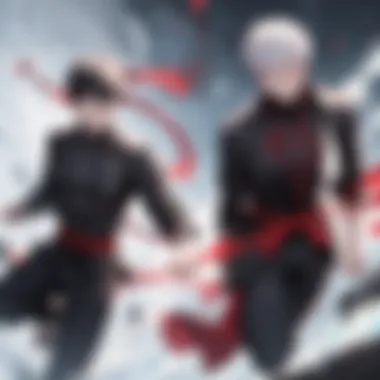Impact of Dubbing in Jujutsu Kaisen: A Detailed Analysis


Intro
The world of anime has seen a significant transformation over the past decade, with Jujutsu Kaisen emerging as a standout series. Its appeal lies not only in its captivating story and dynamic animation but also in the effectiveness of its dubbing. The dubbing of Jujutsu Kaisen has had a substantial impact on how audiences perceive characters and storylines. This article aims to provide an analytical perspective on the dubbing process of the series, highlighting key aspects that influence audience engagement and character interpretation.
Throughout this exploration, we will dissect various components such as character profiles, thematic explorations, and cultural references. We will also examine the challenges faced by voice actors in bringing these richly developed characters to life, and how these efforts resonate with different demographic segments. Understanding these elements will provide a clearer picture of how dubbing affects the overall experience of viewing Jujutsu Kaisen.
Character Profiles
Overview of Main Characters
In Jujutsu Kaisen, the characters are multifaceted, each bringing unique attributes to the narrative. The main protagonist, Yuji Itadori, is characterized by his fierce determination and compassion. His journey into the world of jujutsu sorcery reflects his internal struggles, making the dubbing crucial in conveying his emotional depth. The voice acting must balance his youthful exuberance and moments of serious introspection.
Megumi Fushiguro serves as a foil to Yuji. His reserved demeanor and sense of duty are pivotal to the storyline. The voice actor’s ability to express Megumi’s complexity enhances the audience’s understanding of his motivations and conflicts.
Nobara Kugisaki, another significant character, showcases strength and independence. The dub's portrayal of her character is essential, as her roles challenge traditional gender norms prevalent in anime. The voice acting needs to capture her assertiveness while adding layers to her character.
Supporting Characters
Supporting characters like Satoru Gojo and Ryomen Sukuna also play critical roles in shaping the narrative. Gojo’s charismatic and powerful nature contrasts sharply with Sukuna's menacing presence. The dubbing for these characters must accentuate their distinct qualities. Gojo’s relaxed yet authoritative tone and Sukuna’s eerie, malevolent voice both significantly influence audience perception. Their interplay adds richness to the storytelling, deepening engagement with the series.
Theme Exploration
Central Themes
Jujutsu Kaisen explores themes of friendship, mortality, and the struggle against curses. The dubbing process must communicate these themes effectively. Voice actors contribute to the portrayal of camaraderie among characters, which often serves as a counterbalance to darker plot elements. The way voices shift during intense moments can enhance tension and emotional impact, driving the narrative forward.
Cultural References
Cultural references within Jujutsu Kaisen are woven throughout the dialogue. Dubbing that maintains these nuances requires a thorough understanding of both the source material and the cultural context. For example, various references to Japanese folklore and traditions heighten authenticity and enrich the viewing experience. Ensuring that these cultural elements resonate with international audiences is a challenging yet rewarding aspect of the dubbing process.
Reception and Audience Impact
The reception of dubbed anime varies significantly across demographics. Older audiences might prefer subtitles due to a richer connection with original voice acting. In contrast, younger viewers often embrace dub versions for accessibility and ease of understanding. Ultimately, the effectiveness of the dubbing in Jujutsu Kaisen will influence how different audience segments engage with the series.
"Dubbing is not just about translating words; it's about conveying emotion and context that resonates with the viewer."
The community's response to dubbing practices has shifted over time. Many fans now advocate for diversity in voice acting, demanding representation that reflects the characters’ backgrounds. This aspect highlights the evolving expectations of the anime-viewing community, shaping the future of anime localization.
Preface to Jujutsu Kaisen and Its Dubbing
The exploration of Jujutsu Kaisen's dubbing is not merely an analysis of voice performances. It is a window into the intricate relationship between animation and culture. The series, which has gained significant global popularity, relies heavily on the nuances of dubbing. This section sets the stage for understanding how dubbing shapes audience perceptions and character interpretations.
Overview of Jujutsu Kaisen
Jujutsu Kaisen, created by Gege Akutami, is a modern shounen anime that intertwines supernatural elements with deep themes of friendship, sacrifice, and existential conflict. The story follows Yuji Itadori, who becomes embroiled in the world of jujutsu sorcery after consuming a cursed object. The blend of engaging characters, emotional arcs, and high-stakes battles make it appealing to a wide audience.
The series stands out not just for its gripping storyline but also for its vibrant animation and strong character dynamics. Each character is compelling, and their development is crucial in building the narrative. The anime effectively utilizes various stylistic elements, making it a noteworthy case study in anime localization and dubbing.
Importance of Dubbing in Anime
Dubbing plays a pivotal role in how an anime is received by audiences outside Japan. When viewers engage with a dubbed version, they often form their emotional connections through voice performances. Thus, effective dubbing can enhance the storytelling experience.
Several elements underscore the importance of dubbing:
- Accessibility: Dubbing allows non-Japanese speakers to access the narrative without barriers. It opens up the anime to a broader audience.
- Character Interpretation: Voice actors bring life to characters, shaping how they are perceived. Inflections, tone, and delivery can change a character's personality and motivations.
- Cultural Nuance: Dubbing can adapt cultural references, making them relatable to a different audience while striving to retain the original meaning.
"The challenge is to keep the essence of the characters while making them resonate with a diverse audience."
In summary, the dubbing of Jujutsu Kaisen not only aids in comprehension but also significantly impacts how the characters and their journeys are experienced by viewers. Understanding the nuances of this process offers valuable insights into anime localization and the broader implications for the industry.
The Process of Dubbing: An Inside Look
Dubbing is a fundamental aspect of transforming an anime series like Jujutsu Kaisen for audiences who might not speak Japanese. This process is not simply about replacing one language with another; it involves various intricate steps that ensure the story maintains its integrity while being accessible to a broader audience. In this section, we will explore the essential elements of dubbing that bring the characters and their narratives to life, including casting voice actors, recording techniques, and the synchronization of voice with animation.
Casting Voice Actors
The selection of voice actors is one of the most critical components in the dubbing process. Casting directors aim to find voices that resonate with the characters' personalities. The right voice can significantly enhance a character's appeal, making moments of tension or comedy more impactful.
Directors often conduct auditions to assess range and suitability. They consider not only the acting ability but also how well the voice fits the character's age, gender, and emotional depth. For instance, Yuji Itadori, the protagonist, requires a voice that reflects both youthful energy and depth faced with adversity. It is essential that the chosen voice actor can convey a variety of emotional states throughout the series. This careful casting can affect audience perception, influencing how viewers relate to the characters' journeys.


Recording Techniques and Technology
The technology used in the recording process has evolved immensely over the years. In Jujutsu Kaisen, advanced recording studios utilize high-quality microphones and soundproof environments to capture clear and precise vocal performances. The use of digital audio workstations (DAWs) allows for detailed sound editing and enhancement, ensuring that the final product is polished.
Voice actors typically record their lines while watching the anime scene. This synchronous approach helps actors deliver lines that match the character's visual expressions and physical actions. Moreover, recording technology enables producers to overlay sound effects and music harmoniously, further enriching the viewing experience. This synergy between voice work and technology enhances the overall quality, ensuring that the dubbed version remains faithful to the original.
Synchronizing Voice with Animation
Synchronization is perhaps one of the most challenging aspects of dubbing. The voice needs to align perfectly with the character's mouth movements and actions. This requires meticulous attention to timing. While some dialogues can be easier to adapt, certain emotional scenes may demand more creative adjustments to ensure that timing does not compromise impact.
Dubbers often use a process called lip-syncing, where they adjust the delivery of lines to match the animation. They might need to rewrite dialogue or even re-record lines to achieve the desired synchronicity. This process allows for a more cohesive viewing experience where the dubbed voice feels as if it naturally follows the animated speech.
"The success of dubbing relies on how well the voice acting complements the animation, creating an immersive experience for viewers."
Cultural Considerations in Dubbing
In anime dubbing, cultural considerations play a vital role. Understanding and adapting to the culture is essential for a successful localization of content. Jujutsu Kaisen, like many anime, includes numerous cultural elements that reflect Japanese customs, humor, and social norms. Dubbing this series requires careful attention to these subtleties to ensure the intended message resonates with audiences outside Japan.
The process of adapting cultural references often involves more than simply translating dialogue. It includes adjusting certain phrases or concepts that might be unfamiliar to international viewers. This adaptation aims to make the story relatable without losing its original essence. Dubbing teams must balance between retaining the unique traits of the source material and presenting it in a way that makes sense in another cultural context.
Adapting Japanese Cultural References
When adapting Japanese cultural references in Jujutsu Kaisen, it is crucial to recognize the specific elements that may not have direct equivalents in other cultures. For instance, terms related to Shinto beliefs or traditional ceremonies might confuse viewers who are unfamiliar with these concepts. In such cases, it is common for localization teams to explain or simplify these references.
The impact of this adaptation can include the following:
- Loss of nuance: Sometimes, the rich meaning behind a Japanese phrase may not fully translate.
- Altered character portrayal: Characters' backgrounds may shift in interpretation, depending on how their culture is presented.
Effective adaptation can deepen viewer understanding and appreciation of the characters and story, while also keeping the narrative engaging for an international audience.
Maintaining Authenticity vs. Localization
The tension between maintaining authenticity and effective localization presents a unique challenge. On one hand, viewers who appreciate anime seek an authentic experience that reflects Japanese culture accurately. On the other hand, localization aims to make material accessible and engaging for a different language audience. In the case of Jujutsu Kaisen, ensuring character depth and interaction aligns with cultural expectations is important.
A few strategies used to balance authenticity with localization include:
- Preserving key terminology: Certain phrases or names are often kept in their original form to maintain authenticity.
- Cultural notes: Some publishers include footnotes or additional resources for viewers to understand references better.
- Diverse voice casting: Using actors who understand the cultural context can foster a more genuine portrayal of characters.
This ongoing balancing act influences how fans experience Jujutsu Kaisen and reflects broader trends in anime localization practices.
"Dubbing is not merely about translation, but about interpretation. Maintaining authenticity while adapting to cultural contexts ensures a deeper connection with audiences."
Ultimately, the success of dubbing in anime like Jujutsu Kaisen relies on a keen understanding of cultural nuances. It is a sophisticated process that requires thoughtful execution.
Character Portrayal through Dubbing
The process of dubbing plays a critical role in shaping how characters are perceived by the audience. In the context of Jujutsu Kaisen, this aspect becomes particularly important. Various elements come into play when voice actors interpret characters through their performances.
First, voice acting styles significantly influence character portrayal. Different actors bring unique interpretations to their roles. For instance, a character known for being stoic may be depicted with deep, measured tones, while a more dynamic character may have a varied vocal range. This disparity in voice acting styles not only emphasizes characters’ personalities but also impacts the emotional weight carried in key scenes.
Second, the choice of voice actors can affect the relatability of characters. An actor who connects well with the audience can enhance character depth. The more authentic the performance feels, the more likely viewers will engage with the content. These nuances allow characters to resonate beyond the screen, making their arcs more compelling.
In addition to styles and actor choice, directorial guidance is crucial. A director can shape the performance to ensure a character’s voice matches their visual representation. This synchronization between visuals and audio is vital in creating a coherent narrative.
Overall, character portrayal through dubbing hinges on several specific elements. The combined efforts of voice actors, directors, and sound engineers culminate in a product that can transform how viewers experience Jujutsu Kaisen.
Voice Acting Styles and Their Impact
Voice acting styles serve as a foundational element in the dubbing process. These styles determine how each character is embodied vocally, leading to varying impacts on audience perception. For example, Yuji Itadori, the main protagonist, has a youthful, energetic quality to his voice, which reflects his character's determination and optimism. On the other hand, characters like Satoru Gojo may have a smoother, more charismatic delivery, reflecting their confidence and charisma.
The subtleties in voice acting can greatly enhance emotional resonance. A simple change in pitch or pacing can convey anxiety, happiness, or despair. When voice actors adapt their styles to fit the scene, it improves the overall storytelling. For instance, a tense moment effectively portrayed through sharp, clipped delivery can evoke a sense of urgency, whereas a softer tone can provide a moment of relief and reflection.
The audience can identify with these styles; therefore, they can enhance the immersion into the narrative. Viewers may develop attachments to specific characters based on the voice they hear, leading to memorable experiences within the show.
Audience Reception of Character Voices
Audience reception of character voices plays a significant role in the success of a dubbed anime. Viewers bring their expectations, often influenced by the original Japanese version, into the experience. The reception can vary widely, depending on personal tastes and cultural perceptions.
Many fans actively discuss their opinions on platforms like Reddit, often contrasting the original voices with the English dub. They may express strong preferences, emphasizing the significance of staying true to the character's essence. This interaction can reveal patterns in audience expectations across different demographics, revealing how younger and older viewers may differ in their preferences and tolerances regarding dubbing choices.


There is also an element of nostalgia that can affect reception. Fans who have grown attached to the original characters may find it challenging to accept changes in voice portrayal. Some may argue that the emotional core of a character can be lost in translation if the voice does not align with their expectations.
Ultimately, audience feedback shapes the direction of future dubbing projects. Studio producers and directors often take these reactions into account to refine the dubbing process, attempting to strike a balance between originality and audience satisfaction. The evolving landscape of dubbing illustrates a dynamic interplay between creators and their viewers, where each side influences the other, ultimately enhancing the experience in the anime community.
Challenges in Dubbing Jujutsu Kaisen
The dubbing of Jujutsu Kaisen presents numerous challenges that are crucial for understanding the overall effectiveness of the localization process. Dubbing is not merely about translating dialogue; it also involves conveying emotion, maintaining pacing, and ensuring that the characters align with their original intent. These factors can dramatically influence audience engagement and the reception of the anime. Responding to the nuances of voice acting while trying to preserve clarity is essential, especially given the emotionally charged themes of Jujutsu Kaisen.
Balancing Emotional Resonance and Clarity
One of the most significant challenges in dubbing Jujutsu Kaisen is striking a balance between emotional resonance and clarity. Voice actors must interpret the original Japanese performances while ensuring that their delivery feels authentic in English. This task is complex, as they must convey the same intensity and emotional nuances that the original actors achieve in Japanese. Failing to do so may lead to a disconnection between the character's visual expressions and their spoken words.
The emotional impact of a scene can be diminished if the dubbed lines come across as flat or unconvincing. For instance, in high-stakes moments like battles or pivotal character revelations, the voice's tonality and inflection are crucial. If the dubbing lacks emotional depth, it could disengage viewers. Therefore, voice actors often undergo intensive coaching to master the cadences and inflections that maximize emotional impact while maintaining clarity.
Effective dubbing includes
- Emotional consistency: Maintaining the emotional tone of the original.
- Articulation and pace: Ensuring dialogue is easy to follow without losing dramatic effects.
An improvement in this area boosts characters' relatability and may enhance audience enjoyment. By prioritizing both emotional engagement and clarity, the dubbed version can resonate strongly with viewers.
Technical Limitations and Solutions
Technical limitations play a fundamental role in the dubbing process of Jujutsu Kaisen. Factors such as audio equipment, recording environments, and software capabilities influence the final product. For instance, background noise or subpar acoustics can compromise sound quality. Additionally, the editing process must be meticulous to synchronize the voice tracks with the animation, as any delay or mismatch can break the viewer's immersion.
To tackle these challenges, studios may employ various solutions:
- Advanced recording technology: Utilization of high-fidelity microphones and soundproof studios can enhance audio quality.
- Collaborative tools: Voice actors and directors may use software that allows them to visualize the animation frames in real-time, thus adjusting their performance accordingly.
Keeping up with technological advancements is essential for making dubbing processes more efficient. New tools allow for a smoother workflow and improved outcomes in character portrayal and emotional delivery. Studios must continuously adapt to these advancements to maintain competitive quality in anime localization.
"The essence of dubbing lies in its ability to bridge cultural divides while remaining true to the source material's intent."
The challenges in dubbing Jujutsu Kaisen illustrate the intricacies involved in anime localization. By addressing both the emotional and technical hurdles, the dubbing process not only strives for accuracy but also enhances the overall viewing experience. This approach ultimately strengthens the connection between characters and their audiences, supporting the success of the anime in global markets.
The Role of the Director in Dubbing
The director's role in dubbing is crucial for enhancing the entire voice acting process. The director not only provides creative vision but also ensures that the performances align with the original intent of the animated work. In the case of Jujutsu Kaisen, this role becomes even more significant due to the complex emotional layers and dynamic action sequences present in the series. By guiding the voice actors, the director influences various aspects of performance, which ultimately shapes the audience's perception and connection to the characters. Understanding this role is essential to comprehend the intricacies behind dubbing this popular anime.
Directorial Decisions and Their Influence on Performance
Directorial decisions can greatly affect how a character is portrayed. A skilled director can draw out nuanced emotions and unique delivery styles from voice actors. For instance, during pivotal scenes in Jujutsu Kaisen, where the stakes are high, a director might instruct an actor to deliver lines with heightened urgency or subtlety, depending on the moment's context.
Several factors impact how directorial choices influence performance:
- Character Depth: Decisions about how a character should sound can either deepen or detract from their personality. An authoritative character like Satoru Gojo requires a confident tone that reflects his position and abilities.
- Matching the Animation: The timing and pacing of the characters’ lines should sync up with their animated actions. A director will often adjust performances to ensure smooth synchronization.
- Contextual Nuance: Understanding the scene's context allows directors to guide actors in embodying the character's emotional state convincingly. This is especially vital in high-stakes moments where a character's psychological state is fragile.
Collaboration between Actors and Directors
The collaborative relationship between voice actors and directors can be a central factor in achieving an effective dub. This partnership fosters an environment where ideas and adjustments flow freely, allowing for creative expression. In Jujutsu Kaisen, successful collaboration can breathe life into the characters through authenticity.
Key aspects of this relationship include:
- Trust: Actors must trust their director to make choices that honor their performances. This trust fosters a sense of security that enables actors to explore their character's emotional range.
- Feedback Exchange: Constructive feedback during recording sessions helps refine performances. A good director will provide feedback that encourages actors while also challenging them to reach new heights.
- Shared Vision: When both the director and actors align on the presentation and tone of characters, it becomes easier to convey the central themes of the series. This alignment is particularly important for maintaining the balance of humor and tension that characterizes Jujutsu Kaisen.
"Directors are essential mediators between the original artistic intent and the localized interpretation. Their impact echoes throughout the audience’s experience."
In summary, the director's role in dubbing Jujutsu Kaisen is multifaceted, involving a balance between artistic vision and practical execution. These elements play a significant role in determining how effectively the story resonates with viewers.
Viewer Demographics and Dubbing Preferences
Understanding the viewer demographics and their preferences plays a crucial role in analyzing the dubbing of anime such as Jujutsu Kaisen. By examining who the audience is, how they engage with content, and their expectations from dubbed material, one can gain deeper insights into the complex landscape of anime localization. The preferences can vary significantly based on age, cultural background, and viewing habits, and these factors influence the reception of dubbed shows.
Audience engagement goes beyond mere viewership numbers. Different demographics often have preferred styles of dubbing. For example, younger audiences may favor more casual language and contemporary references, while older viewers might appreciate a more formal approach that remains faithful to the original dialogue. Additionally, fans familiar with the cultural context of the show may demand accuracy in nuances that can become lost during localization. This awareness shapes how dubbing studios decide on the tone and voice for each character.
Similarly, accounting for geographical preferences is vital. For example, audiences in North America may prefer a different vocal style or pacing compared to viewers in Europe or Asia. Recognizing these variations helps in creating a vibrant, relatable character experience that resonates across cultures.
Understanding Audience Expectations
As the anime industry grows, so do viewer expectations. With the rise of global streaming services, audiences are exposed to diverse dubbing styles, which leads to a more informed viewer base. Fans expect high-quality performances that closely align with their understanding of the original content. They desire voice actors who can encapsulate the depth of characters and convey their emotional arcs authentically.


These expectations are influenced by previous viewing experiences, as fans compare the quality of different shows. Jujutsu Kaisen's dynamic characters require voices that match their personalities or emotional states, which can greatly enhance the viewing experience. When fans feel that the characters are naturally voiced, they develop a stronger connection to the narrative.
Generation Differences in Dubbing Reception
As different generations engage with anime, their appreciation and criticism of dubbing practices also diverge. Older fans, who may have grown up with subtitled anime, sometimes maintain a preference for original language accompanied by subtitles, viewing dubbing as secondary. Conversely, newer viewers, especially younger audiences, often appreciate dubbed versions for their accessibility and ease of understanding.
This generational divide highlights varying tolerance levels for voice acting styles and localized content. While younger fans may prioritize relatable language and contemporary references, older fans may focus more on the authenticity of the voice acting that reflects the original material.
The increasing availability of streaming platforms has also transformed access patterns. Younger audiences often consume content on mobile devices, favoring formats that allow for binge-watching. As a result, dubbing preferences can shift accordingly, focusing more on brevity and relatability, which influence how dubbing teams approach new productions.
Understanding these generational differences is key to tailoring dubbing strategies that cater to both nostalgia and modern expectation. The challenge lies in creating dub performances that resonate authentically with various segments of the demographic spectrum.
Community Responses to Dubbing Decisions
Understanding community responses to dubbing decisions is essential in analyzing Jujutsu Kaisen's English version. The way fans react to these choices can influence the overall success of a dubbed anime. It shows the viewers' engagement, which directly affects the anime's reception. Dubbing not only translates language but also carries cultural nuances and character depth. Fans often feel a strong connection to the original material, creating an expectation for the dubbed version to meet their standards.
This section dives into two specific facets of community responses: fan reactions and critiques, as well as the influence of social media on dubbing trends.
Fan Reactions and Critiques
Fan reactions to Jujutsu Kaisen's dubbing are varied. Some viewers applaud the voice actors for bringing characters to life, while others express disappointment when the voices do not match their expectations.
Critiques may stem from various reasons:
- Voice Fit: Sometimes the chosen voice might not match the character’s personality or traits.
- Dialogue Choices: Adaptation decisions can lead to mixed reactions, especially if cultural references are changed.
- Performance Quality: The actors' performances can receive high scrutiny. Fans often compare them to the original Japanese voices, creating a bar for the dubbed version to achieve.
Ultimately, fan reactions provide valuable feedback for producers. Positive reactions can lead to increased viewership and support for future projects, while negative responses can discourage continued dubbing efforts.
Social Media Influence on Dubbing Trends
Social media plays a critical role in shaping opinions about anime dubbing. Platforms like Reddit and Facebook facilitate discussions where fans share their thoughts almost immediately after a new episode releases. These platforms are essential for gathering community sentiment.
Key points regarding social media's influence include:
- Rapid Feedback: Fans can instantly discuss and critique episodes, giving creators real-time insights into audience preferences.
- Viral Trends: Sometimes, particular performances or dubbing choices become trending topics. This can either boost a series' popularity or lead to public outcry.
- Communal Identity: Fans often bond over their shared experiences and opinions about the dubbing. This camaraderie can promote community-driven initiatives, such as fan-translated subtitles or unofficial critiques.
As the anime community evolves, so too does the dialogue around dubbing decisions. The lively interaction between fans and creators ensures a dynamic relationship in anime localization.
Future Trends in Anime Dubbing
The exploration of future trends in anime dubbing holds significant value within the context of Jujutsu Kaisen and the broader anime industry. As the global audience for anime continues to expand, understanding these trends can provide insights for voice actors, production companies, and fans alike. Rapid technological advancements and evolving cultural perspectives shape dubbing practices, enhancing the overall viewing experience for audiences. By discussing the implications of these trends, we can better appreciate the profound impact they have on character portrayal and audience engagement.
Advancements in Technology and Their Impact
Technological progress has fundamentally altered the landscape of anime dubbing. One major advancement is in recording technology. Studios now utilize high-definition audio equipment, enabling clearer and more precise sound quality. This ensures that voice performances resonate well with the animation, creating a more authentic experience for viewers.
Additionally, software innovations such as artificial intelligence and machine learning are becoming increasingly prevalent. These tools assist in voice modulation and can even automate certain aspects of the dubbing process. For example, AI can analyze dialogues to suggest the best tonal adjustments, leading to improved emotional delivery. This efficiency saves time and resources in production without sacrificing quality.
Furthermore, remote recording capabilities have transformed the way voice actors collaborate. The pandemic accelerated this trend, making virtual sessions a standard practice. This allows voice actors from around the world to participate in projects without geographical barriers. Such flexibility opens up a diverse talent pool, enriching the voice options available for Jujutsu Kaisen and similar anime series.
The Changing Landscape of Localization
Localization continues to evolve alongside advancements in technology, embracing more nuanced approaches to cultural translation. In the past, localization primarily focused on literal translations. Today, it involves a deeper understanding of cultural references and the adaptation of dialogue to resonate with global audiences. This is crucial for maintaining the essence of characters and the story.
Key elements influencing this landscape include:
- Cultural Sensitivity: Localizers must strike a balance between staying true to the original material and making it relatable for different cultures.
- Audience Feedback: With social media channels like Reddit and Facebook playing a significant role, audience reactions can directly influence future dubbing practices. Producers are increasingly aware that fan input can guide localization choices.
- Diverse Narratives: The demand for varied storytelling necessitates a broader spectrum of voices in dubbing. This means not only focusing on voice quality but also on cultural representation in casting.
"Localization is not just about language; it’s about understanding the audience’s cultural context."
In summary, the future of anime dubbing is shaped by both technological innovations and evolving cultural practices. As these trends develop, they open new avenues for creative expression, ensuring that anime continues to flourish in a global market.
Finale
The conclusion is fundamental in tying together the myriad insights explored throughout the article regarding Jujutsu Kaisen dubbing. This section synthesizes the key points, offering clarity on the implications for both fans and industry professionals alike. It serves as a reflective endpoint, where the reader can appreciate the thorough examination of how dubbing nuances add layers to character interpretation and influence audience experience in anime.
Summary of Key Findings
- Dubbing's Role: The dubbing process is essential in bridging cultural gaps between the original Japanese narrative and the international audience. It shapes how characters are perceived emotionally and contextually.
- Cultural Context: Adapting Japanese cultural references into a format that resonates with global viewers has proven complex yet vital. Successful localization retains the core story while making it relatable.
- Viewer Reception: Audience preferences vary across demographics, influencing how dubbing decisions are made. Younger viewers may prefer original Japanese audio with subtitles, while others may opt for dubbed versions.
- Industry Challenges: Voice actors face various challenges, including balancing emotional depth with clear delivery. The technology used in dubbing continues to evolve, impacting overall sound quality and actor performance.
Implications for the Anime Industry
The insights gathered from this analysis highlight critical implications for the anime industry. As the market continues to expand globally, there is an increasing need for adaptation strategies that respect original content while catering to a diverse audience. This involves:
- Rethinking Dubbing Strategies: Companies must consider audience demands when producing dubbed versions, taking into account varying preferences across regions.
- Investment in Technology: There should be greater investment in advanced recording and editing technologies, enhancing the audio quality of dubbing. This leads to improved viewer satisfaction.
- Empowering Diverse Voices: Embracing cultural diversity in voice casting enriches the narrative depth, allowing for authentic portrayals of characters.
Through these actions, the anime industry can ensure continued growth and relevance, remaining responsive to an evolving audience landscape while also preserving the essence of beloved titles like Jujutsu Kaisen.





